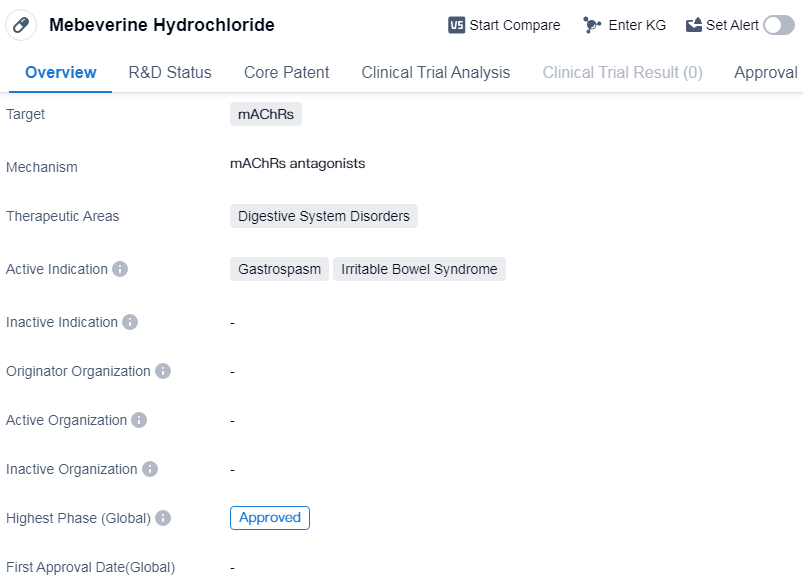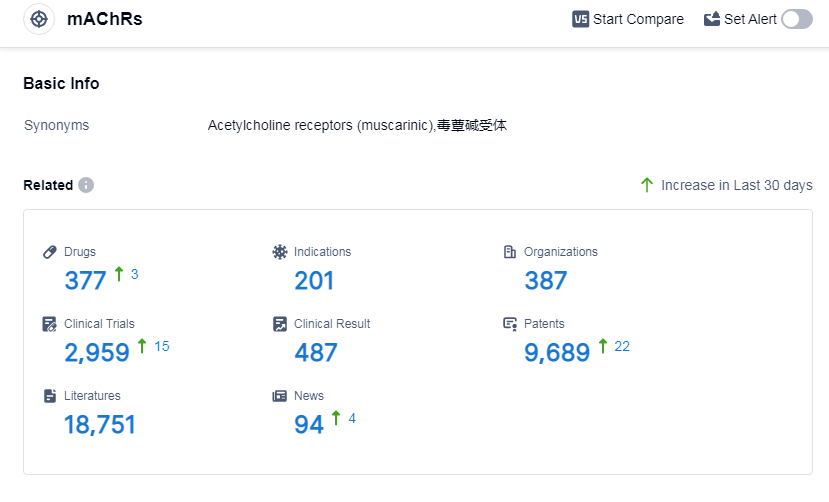Unleashing the Power of Mebeverine Hydrochloride: A Comprehensive Review on R&D Breakthroughs
Mebeverine Hydrochloride's R&D Progress
Mebeverine Hydrochloride is a small molecule drug that primarily targets muscarinic acetylcholine receptors (mAChRs). It is used in the treatment of digestive system disorders, specifically gastrospasm and irritable bowel syndrome (IBS).
Gastrospasm refers to the involuntary contractions of the muscles in the gastrointestinal tract, leading to symptoms such as abdominal pain, bloating, and discomfort. Mebeverine Hydrochloride helps to relieve these symptoms by relaxing the smooth muscles in the digestive system, thereby reducing spasms and improving overall gastrointestinal function.
IBS is a chronic disorder characterized by abdominal pain, changes in bowel habits, and bloating. It is believed to be caused by abnormal contractions of the intestinal muscles and increased sensitivity to pain. Mebeverine Hydrochloride is commonly prescribed to manage the symptoms of IBS, providing relief from abdominal pain and discomfort.
In terms of drug development, Mebeverine Hydrochloride has reached the highest phase of approval globally. This indicates that it has undergone extensive clinical trials. The drug has been thoroughly evaluated for its efficacy, safety profile, and potential side effects.
As a small molecule drug, Mebeverine Hydrochloride is likely to have a well-defined chemical structure and can be easily synthesized in a laboratory setting. This characteristic makes it suitable for large-scale production and distribution.
👇Please click on the image below to directly access the latest data (R&D Status | Core Patent | Clinical Trial | Approval status in Global countries) of this drug.
Mechanism of Action for Mebeverine Hydrochloride: mAChRs Antagonists
mAChRs antagonists refer to muscarinic acetylcholine receptor antagonists. These are a class of drugs that block the action of acetylcholine on muscarinic receptors. Muscarinic receptors are a type of receptor found in various tissues and organs, including the central nervous system, smooth muscles, and glands.
From a biomedical perspective, mAChRs antagonists are commonly used in the treatment of various conditions such as overactive bladder, chronic obstructive pulmonary disease (COPD), and certain gastrointestinal disorders. By blocking the muscarinic receptors, these antagonists inhibit the effects of acetylcholine, which alleviates symptoms associated with excessive cholinergic activity.
In general understanding, mAChRs antagonists can be seen as medications that counteract the effects of acetylcholine. They are used to treat conditions where excessive activity of acetylcholine can cause unwanted symptoms or complications. These drugs work by blocking the receptors that acetylcholine bind to, thus reducing its effects.
Drug Target R&D Trends for Mebeverine Hydrochloride
According to Patsnap Synapse, as of 14 Sep 2023, there are a total of 377 mAChRs drugs worldwide, from 387 organizations, covering 201 indications, and conducting 2959 clinical trials.
Based on the analysis of the target mAChRs, Pfizer Inc. and C.H. Boehringer Sohn AG & Co. KG are the companies with the highest stage of development. The indications with the highest number of approved drugs include pulmonary disease, chronic obstructive, urinary bladder, overactive, and spasm. Small molecule drugs are progressing rapidly, and there is competition around biosimilars. China, Japan, the United States, and the European Union are the countries/locations developing fastest. China has shown significant progress in the development of drugs targeting mAChRs. Overall, the competitive landscape for target mAChRs is dynamic, with potential for future growth and development.
👇Please click on the picture link below for free registration or log in directly if you have a freemium account, you can browse the latest research progress on drugs, indications, organizations, clinical trials, clinical results, and drug patents related to this target
Conclusion
In summary, Mebeverine Hydrochloride is a small molecule drug that targets mAChRs and is primarily used in the treatment of digestive system disorders, specifically gastrospasm and irritable bowel syndrome. It has reached the highest phase of approval globally, indicating its safety and efficacy. The drug works by relaxing the smooth muscles in the digestive system, providing relief from symptoms such as abdominal pain and discomfort.






